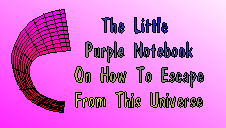
24. Definition of 'Definition'
Literally, 'definition' means to 'limit' something.
While it seems to make good sense in many occasions to draw the boundaries of a concept in order to better communicate, an inherent danger lures in the jungle of words. Cloaked in the impressive outfit of rational, or even 'scientific', thinking it can strangle the innocent beholder in a surprisingly short time.
The viciousness of this trap lies not only in the sneaky way in which it ties up the mind, but even more so in its effect to make the victim believe how splendid and vital it would be for him or her.
This may be hard to believe at first. An analysis of how 'definitions' are used in 'cults' or cultures, however, reveals very quickly that the way 'definitions' are treated shows up as a common feature in all of them.
This becomes obvious to such a marked degree that one could even posit that this trait could not only be used to identify a 'cult' as such but also to classify its 'strength' as a group (cp. the notes on Group Identities).
It works in (at least) two ways:
based on the need to point to a concept in the jungle of words, the definitor or indoctrinator points to 'markers' that are in the vicinity of the concept to be 'defined'. Using language, the markers will be other words.
This 'definition', or 'limiting', appears both necessary and harmless.
However, if it is not kept in mind that the 'markers' used to 'limit' the boundaries of the concept are in itself words that have boundaries themselves, the indoctrinated mind may form an identification of the concept with the boundaries that have been used to limit it.
In other words, even if the victim is aware of the truth in 'the word is not the thing', s/he may take the 'definition as the thing' without further thinking.
Now, the problem of defining words with words, is an example of a fractal structure in which one can get quickly drowned in definitions of definitions but for which there seems no other feasible way in daily life.
Therefore, the _awareness_ of the inherent danger of identifications or static associations seems to be the only safeguard against it.
In a 'cult' context, the _definition_ now takes
the quality of the word of God or the Founder. Any member who does not
use the exact wording that was provided in the
original definition will be frowned upon.
But since the indoctrinated now 'knows' the correct definition s/he will be happily convinced that s/he 'knows' the one and only truth and will fight any other wording vehemently.
A dead give-away for any cult member therefore is the way s/he responds to any question: it will nearly always be in the form of a quote of one or more of the definitions that in his or her mind 'is the thing'.
And you'll be eternally damned if you don't accept it!
If life should ever get boring for you, try walking up to someone of whom you think s/he may be member of a cult. Ask why s/he can't explain a single, darn thing in his or her own word and be prepared for a good laugh! You'll hear the most amazing justifications you've heard in a long time. (Don't forget a notepad: some of these justifications will be so ingenious that you may want to use them for yourselves next time you fouled up and need an excuse!)
Very often this thinking in rigid definitions is sold as 'lingo' for which there would be no way around. If new words are being created for the ease of communications, that's one thing - not being able to reformulate a concept in different words is quite another.
Again, 'awareness is everything', and hard definitions of the kind described should be replaced by soft definitions with the readiness the re-define its components as appropriate.
But what is 'appropriate' in this context? It will certainly help if one would make it a frequent exercise to explain concepts without any 'lingo', or, even better to find 'parables' or examples in daily life that reflect the concept. If the concept is valid, there will be other instances in nature that contain a similar structure.
There is second potential trap in using 'definitions'. It is commonly called 'circular reference'. Upon closer inspection, it appears as a special case of the above.
In a circular reference, the victim is trapped by mutually equating one word with another. Not only does this not help at all with understanding the concept at hand, but it can also prompt the person to think it would 'know' something where in fact it doesn't.
This becomes now another slant on the most basic barrier to learning at large:
If someone is thinking that something is already 'known', then there is no motivation to 'learn'. Or, in an extreme case, a person may _reject_ any form of learning because it would endanger the existing body of 'knowledge' by possibly entering contradictions or new data that would invalidate one's dearly held cleverness.
Now, we all know exactly that all this applies only for these weird guys in these dangerous and extreme cults and they clearly don't deserve better to begin with. Aren't they outlawed already anyway?
Good thing we wouldn't ever do such a thing
ourselves.
After all, we all know what we know, don't
we?